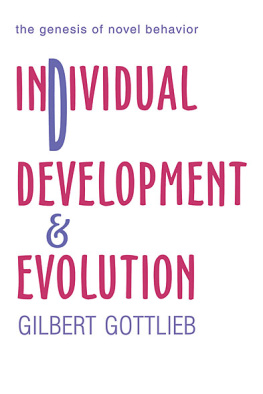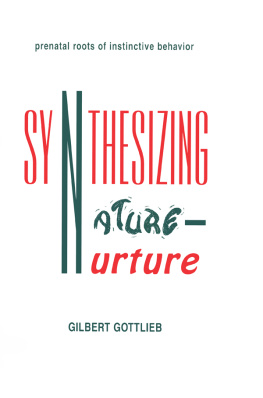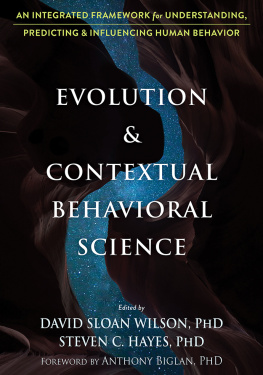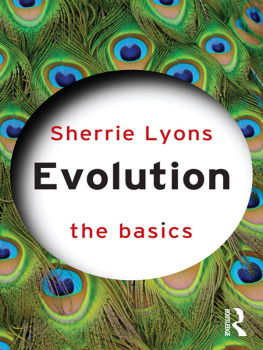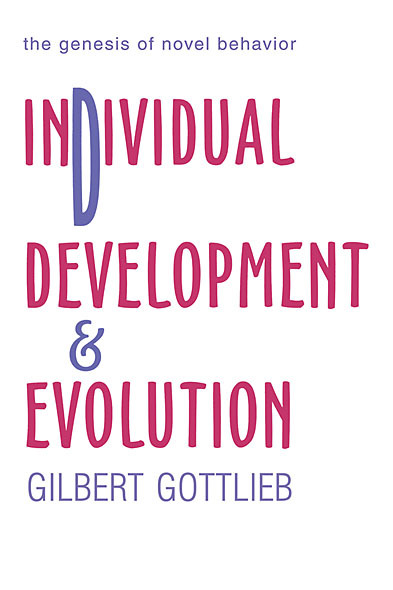The author attempted to contact copyright holders to renew permissions for materials taken from other sources for the purpose of the republication of this book. Most of the permission renewals were obtained. However, in a few cases no response was received despite several inquiries.
Copyright 2002 by Gilbert Gottlieb.
All rights reserved. No part of this book may be reproduced in any form, by photostat, microform, retrieval system, or any other means, without the prior written permission of the publisher.
This edition published in the Taylor & Francis e-Library, 2008.
To purchase your own copy of this or any of Taylor & Francis or Routledges collection of thousands of eBooks please go to www.eBookstore.tandf.co.uk.
1
Conceptions of Development: Preformation and Epigenesis
Preformation and Epigenesis
From the time of Aristotle there have been two competing views about the nature of the process by which individual organisms develop from fertilization to adulthood (= ontogeny). One of these, called preformation, held that a very tiny version of the complete individual is prepackaged in the eggthat is, all the parts and organs are preformed from the outset and individual development consists merely of the growth of these preexisting, fully formed parts until they reach their adult size. The alternative view, the one held by Aristotle and almost every other person who took the trouble to make observations on the growing embryo and fetus, holds that individual development takes place by transformations that bring each part and organ of the body into existence in a series of successive stages. This emergent view, called epigenesis, is the one we hold today. It signifies that individual development includes differentiation as well as growth, the hallmark of which is the progressive
Preformation: Ovists and Animalculists
For our historical understanding it is of some value to describe briefly the two main versions of preformation. Since according to this view the organism was preformed in miniature from the outset, the preformed organism was believed by some to lie dormant in the ovary of the female until development was started by fertilization. This view was held by the ovists. To other thinkers, the preformed organism resided in the semen of the male and development was unleashed through sexual union with the female. These were the animalculists.
Many of the preformationists, whether ovists or animalculists, tended to be of a religious persuasion. In that case they saw the whole of humankind having been originally stored in the ovaries of Eve if they were ovists or in the semen of Adam if they were animalculists. Based upon what was known about the population of the world in the 1700s-at the time of the height of the argument between the ovists and animalculistsAlbrecht Haller, the learned physiologist at the University of Gttingen, calculated that God, in the sixth day of his work, created and encased in the ovary of Eve 200 thousand million fully formed human miniatures. Haller was a very committed ovist.
The sad fact about this controversy was that the very best evidence to date for epigenesis was at hand when Haller made his pronouncement for preformation: There is no coming into being! (Nulla est epigenesis). No part of the animal body was made previous to another, and all were created simultaneously. As Haeckel (1897, vol. 1, p. 39) observed, Haller went so far as to maintain even the existence of a beard in the newborn male, and the existence of horns in the hornless fawn; all the parts were already present in a complete state, but hidden for a while from the human eye. Given Hallers enormous scientific stature in the 1700s, we can only assume that he had an overriding set about the question of ontogenesis (development of the individual) and that set caused him to misinterpret evidence in a selective way. For example, the strongest evidence for the theory of encasement, as the theory of preformation was sometimes called, derived from Bonnets observations, in 1745, of virgin plant lice, who, without the benefit of a male consort, reproduce parthenogenetically (i.e., by means of self-fertilization). Thus, one can imagine the ovist Bonnets excitement upon observing a virgin female plant louse give birth to ninety-five females in a twenty-one-day period and, even more strikingly, observing these offspring themselves reproduce without male contact. Here was Eve incarnate among the plant lice!
Epigenesis: Emergent Nature of Individual Development But the empirical solution of the preformation-epigenesis controversy necessitated direct observation of the course of individual development, and not the outcome of parthenogenetic reproduction, as striking as that fact itself might be. Thus, it was that one Caspar Friedrich Wolff (17331794), having examined the developmental anatomy and physiology of chick embryos at various times after incubation, provided the necessary direct evidence for the epigenetic or emergent aspect of individual development. According to Wolff s observations, the different organic systems of the embryo are formed and completed successively; first, the nervous system, then the skin covering of the embryo, third the vascular system, and finally the intestinal canal. These observations not only eventually toppled the doctrine of preformation but also provided the basis for the foundation of the science of embryology, which took off in a very important way in the next 150 years. Those who like to dwell on the inscrutable coincidences of temporal cycles will undoubtedly be taken by several noteworthy events that followed at regular fifty-year intervals the publication of Wolff s doctoral dissertation in 1759; namely, in 1809 the birth of Charles Darwin and, in the same year, the publication of J.B.Lamarcks Philosophical Zoology, followed precisely fifty years later, in 1859, by the publication of Charles Darwins own Origin of Species.
Before turning to the views of Lamarck and Darwin on evolution, it will be helpful to describe the fruits that resulted from the scientific study of embryology in the early 1800s, especially the work of Karl Ernst von Baer.
Karl Ernst von Baer: The Science of Embryology
Karl Ernst von Baer (17921876) directly examined the physiological and anatomical development of embryos and fetuses in many different species of mammals, birds, fishes, and invertebrates, and examined them more intensively than possibly any other scientist before or since his time. He published his observationsand his reflections on his observationsin two volumes of his big book,

